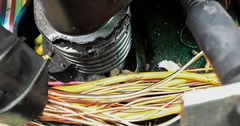Effective Tips for Protecting Your Vehicle Wiring from Rodents
Have you experienced a problem starting your vehicle after a few days of not using it? When the mechanic looks under the hood and finds damaged wiring, it’s likely the car has a rodent problem. When the weather cools down, rodents seek warm places for safety from predators. Unfortunately, one of these places could be your vehicle’s engine, but why? Learn why this happens and how to protect your vehicle from pests.
When Rodents Chew Vehicle Wires
A few myths are going around about why rodents chew wiring in vehicles. Some people think it has something to do with the color coating that covers the wires. People say the coating has a specific ingredient rodents are attracted to and want to eat it. Another myth some believe is the vehicle or wiring gives off a distinct magnetic odor that attracts them to chew on it. Pest control experts don’t believe either of these myths but follow research behind their actions.
Researchers believe rodents chew on wiring because of their growing teeth. It’s thought that chewing helps control their growth and prevents them from getting too sharp. It is likely that rodents chew on wiring because it is a quiet and safe place to hide. The wires are first to chew because they are easier to reach. They also chew through plant stems when lurking outdoors.
Which rodents chew vehicle wiring? Rats are active chewers and are more likely to cause damage faster than other rodents. Any rodent is small enough to hide around your car or get into your engine. Mice can squeeze into holes. Squirrels can get inside through small openings despite their fluffy fur. Chipmunks like to hide where it’s warm when the weather cools down. Sometimes larger animals such as possums, woodchucks, and groundhogs can get into your vehicle, but this is less likely.
Rodents can be attracted to your vehicle’s engine if it’s still warm. They like to hide where they feel warm and secure. Look for rodent droppings where you park your car, food traces, and unpleasant odor. You could also listen for scratching sounds under the vehicle hood.
Rodent Chewing Damages and How to Prevent Them
The amount of damage rodents can do chewing on wiring varies. The damage could be minor or significant depending on the make and model of your car and how long the chewing occurred. It can be challenging for a mechanic to fix since rodents can access tight spaces in and around the engine. Sometimes debris can cause engine problems if the rodent tried to make a nest with things such as paper, leaves, and cardboard.
To prevent rodents from chewing on your vehicle wires, consider where your vehicle is parked and how often you use it. If you don’t use your car too often, it could be something a rodent could choose. Prevent a rodent from getting comfortable in your vehicle by moving it around. Check areas such as damaged doors, dryer vent hoses, utility line pipes, and open space above doors and thresholds. If you park your vehicle in a garage, check for openings or possible entry points they can crawl through and seal them.
A professional pest control expert can set up traps in problem areas. Remove food from these areas, such as pet food, to avoid rodents entering the area where you park your vehicle.
Does Auto Insurance Cover Damages from Rodents?
Check your policy if you’re curious whether rodent damages are covered by car insurance. Sometimes comprehensive policies may cover damages, but check with your insurance company to learn what or if your policy covers such damages.
You can reduce the risk of your vehicle experiencing damage from rodents by taking preventative measures to keep your home and parking space free of rodents. Contact local professional pest control services to discuss your concerns if you suspect rodents in or near your home. Know what to look for when suspecting rodents and be aware of damages rodents can do to cars.



 Service Request
Service Request